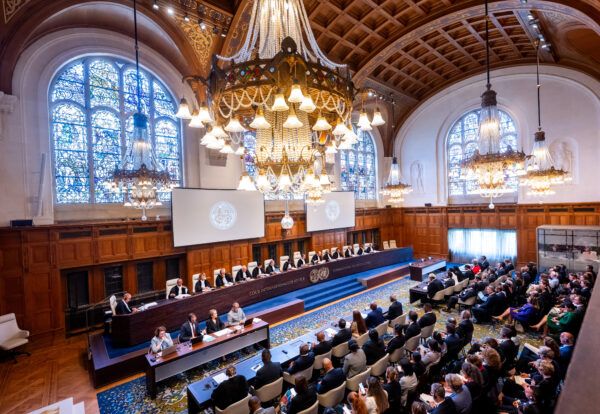Call for Papers: The Role of International Courts and International Institutions in Promoting and Advancing Environmental Rights
Reading time : 3 minutesGreen Diplomacy launches its Call for Papers on “The role of international courts and international institutions in promoting and advancing environmental rights.” Contributions (1000–2000 words) are invited on topics ranging from recent judicial interventions to multilateral agreements and legal pathways for safeguarding future generations. Deadline: January 1, 2026 (early submissions encouraged).

The international legal order is at a crossroads. Recent milestones, ranging from the UN General Assembly’s recognition of the right to a clean, healthy and sustainable environment, to landmark rulings and advisory opinions by regional and international court, including the ICJ’s advisory opinion are transforming how we understand the duties of states towards present and future generations.
The momentum began with the 2021 UNHRC Human Rights Council’s and the 2022 General Assembly’s recognition of the right to a clean, healthy and sustainable environment as a human right. In 2024, the European Court of Human Rights issued the KlimaSeniorinnen judgment, affirming that inadequate climate action can violate fundamental rights under the European Convention. That same year, the International Tribunal for the Law of the Sea delivered its advisory opinion, holding that greenhouse gas emissions amount to marine pollution and trigger preventive and cooperative duties under UNCLOS.
Building on this trajectory, this year, the Human Rights Council encouraged states to implement the right to a healthy environment, highlighting oceans and precautionary approaches. The International Court of Justice then handed down its advisory opinion, affirming that climate action is not optional but a binding duty under treaty law, customary law, and human rights law. In the Americas, the Inter-American Court of Human Rights reinforced this jurisprudential shift with its advisory opinion on the climate emergency, clarifying the responsibilities of states in safeguarding present and future generations.
Alongside these judicial pronouncements, new global instruments are reinforcing state duties, including the High Seas Treaty, which has now reached the threshold to enter into force, creating stronger obligations to protect biodiversity in areas beyond national jurisdiction.
Taken together, these developments illustrate a decisive turn: environmental protection and human rights are now inseparable, and states are legally bound to protect the rights of present and future generations.
In this pivotal context, the Green Diplomacy blog invites contributions to its new Call for Papers on “The role of international courts and international institutions in promoting and advancing environmental rights.”
We welcome short, actionable articles (1000–2000 words) exploring the role of courts, multilateral agreements, and international institutions in advancing environmental rights.
Themes may include:
- Recent judicial interventions and their implications for climate action
- Multilateral agreements and environmental rights
- Legal pathways for protecting the rights of future generations
Deadline for submissions: January 1, 2026 (earlier contributions encouraged).
This is a historic opportunity to contribute to the global conversation on the future of environmental rights.
Guidelines for submission
Content
- Actionable content: the content of the contributions is expected to be concrete, precise, and directly related to the potential recognition of environmental rights by international bodies. Green Diplomacy is an action-oriented blog.
- Intelligible style: publications are expected to be intelligible by diplomats, with a self-contained writing style that is sufficiently comprehensible by jurists and non-jurists alike.
- Key Proposals: in addition to the text of the article itself, submissions should be complemented by a short text summarising the contribution’s key proposals in two or three bullet points.
- Language: the language of publication is English.
Format
- Length: the length of a contribution should be between 1000 and 2000 words, inclusive of any references.
- Footnotes: footnotes may be used on the Blog. However, it is preferable that all references be included through hyperlinks. No distinction is made between endnotes and footnotes.
- Headings: if the contribution has subdivisions, they should be numbered 1.1 (then 1.1.1, 1.1.2, …), 1.2, etc. The introduction is not included in section numbering. Headings should be in bold.
- Citations: citations and references should be put in parentheses immediately after the propositions or quotations that they support.
- Hyperlinks: insert embedded hyperlinks to relevant supporting material and legal texts, including statutes, treaties, and cases. In Word, hyperlinks can be easily embedded by selecting text, right-clicking, and choosing the link option in the contextual menu.
Submission
- Author profile: if this is your first time contributing to Green Diplomacy, we will create your author profile. Please submit a short biography ranging from 100 to 200 words, including, if applicable, a hyperlink to your professional web page and details of any LinkedIn or Twitter profile you may have. Please also attach a colour photo of yourself to your email. You may additionally send any other photographs that are relevant to the content of your post as well as a recent picture.
- Key words: a short list of key words must also be included to ensure proper referencing of the article.
- Revisions: contributors can expect to be asked to revise their contributions and publication is never guaranteed.
Calendar
- Deadline: posts should be submitted preferably prior to January 1, 2026. However, posts submitted afterwards will still be considered.
- How to submit: Posts should be submitted by email at editorial@greendiplomacy.org.
- Publication: articles will be published throughout the duration of the call for papers.
Contact: for any further information, contact us on papers@greendiplomacy.org.
